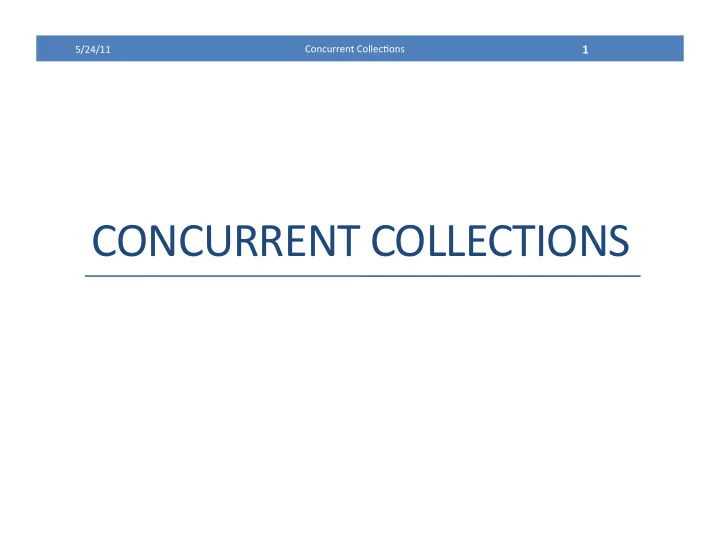

1 ¡ 5/24/11 ¡ Concurrent ¡Collec9ons ¡ CONCURRENT ¡COLLECTIONS ¡
2 ¡ 5/24/11 ¡ Concurrent ¡Collec9ons ¡ Acknowledgements ¡ • Slides ¡and ¡material ¡from ¡ • Kathleen ¡Knobe ¡(Intel) ¡ • Vivek ¡Sarkar ¡(Rice ¡University) ¡
3 ¡ 5/24/11 ¡ Concurrent ¡Collec9ons ¡ CnC ¡– ¡Concurrent ¡Collec9ons ¡ • Declara9vely ¡specify ¡the ¡computa9on ¡ • And ¡the ¡ordering ¡constraints ¡ • Parallelism ¡is ¡implicit ¡ • Available ¡from ¡Intel ¡at ¡ ¡ • hPp://soRware.intel.com/en-‑us/ar9cles/intel-‑concurrent-‑ collec9ons-‑for-‑cc/ ¡
4 ¡ 5/24/11 ¡ Concurrent ¡Collec9ons ¡ Two ¡Sources ¡of ¡Dependencies ¡ • Data ¡Dependency ¡(Producer ¡Consumer) ¡ • Consumer ¡of ¡a ¡data ¡cannot ¡execute ¡before ¡producer ¡has ¡ produced ¡the ¡data ¡ • Control ¡Dependency ¡ • Controllee ¡cannot ¡execute ¡unless ¡its ¡execu9on ¡is ¡determined ¡ as ¡necessary ¡by ¡the ¡Controller ¡
5 ¡ 5/24/11 ¡ Concurrent ¡Collec9ons ¡ Three ¡Kinds ¡of ¡Collec9ons ¡ • ( ¡Step ¡) ¡– ¡represents ¡computa9on ¡ • [ ¡Item ¡] ¡– ¡represents ¡data ¡ • < ¡Tag ¡> ¡– ¡represents ¡control ¡flow ¡
6 ¡ 5/24/11 ¡ Concurrent ¡Collec9ons ¡ Dynamic ¡Instances ¡of ¡Collec9ons ¡ • Mul9ple ¡instances ¡for ¡each ¡Step, ¡Item, ¡Tag ¡collec9ons ¡ at ¡run9me ¡ • Each ¡instance ¡has ¡a ¡unique ¡Tag ¡ • A ¡tag ¡is ¡a ¡tuple ¡of ¡values ¡
7 ¡ 5/24/11 ¡ Concurrent ¡Collec9ons ¡ Item ¡Collec9on ¡ • Each ¡(data) ¡item ¡instance ¡is ¡dynamically ¡wriPen ¡once ¡ • Persists ¡in ¡the ¡‘tuple ¡space’ ¡forever ¡ • Garbage ¡collec9on ¡is ¡implicit ¡ • Each ¡step ¡instance ¡can ¡ • Get() ¡mul9ple ¡item ¡instances ¡from ¡mul9ple ¡item ¡collec9ons ¡ • Put() ¡mul9ple ¡item ¡instance ¡into ¡mul9ple ¡item ¡collec9ons ¡ • Each ¡item ¡can ¡be ¡Get() ¡by ¡mul9ple ¡steps ¡instance ¡
8 ¡ 5/24/11 ¡ Concurrent ¡Collec9ons ¡ Step ¡Collec9on ¡ • Every ¡step ¡collec9on ¡is ¡“prescribed” ¡by ¡a ¡Tag ¡ collec9on ¡ • An ¡step ¡instance ¡with ¡tag ¡T ¡can ¡execute ¡only ¡if ¡T ¡is ¡present ¡in ¡ the ¡prescribed ¡Tab ¡collec9on ¡ • Each ¡(computa9on) ¡step ¡instance ¡is ¡of ¡the ¡form ¡ • A ¡sequence ¡of ¡Item ¡Get()s ¡ • Determins9c ¡side-‑effect-‑free ¡sequen9al ¡computa9on ¡ • A ¡func9on ¡of ¡the ¡tag ¡and ¡data ¡items ¡read ¡ • A ¡sequence ¡of ¡Item ¡Put()s ¡and ¡Tag ¡Put()s ¡
9 ¡ 5/24/11 ¡ Concurrent ¡Collec9ons ¡ Tag ¡Collec9on ¡ • Explicitly ¡specifies ¡the ¡control ¡flow ¡between ¡steps ¡ • A ¡tag ¡collec9on ¡might ¡control ¡mul9ple ¡step ¡collec9ons ¡ ¡
10 ¡ 5/24/11 ¡ Concurrent ¡Collec9ons ¡ Simple ¡Example ¡ • Break ¡an ¡input ¡string ¡into ¡sequences ¡of ¡repeated ¡ characters ¡ • Filter ¡only ¡strings ¡of ¡odd ¡length ¡
11 ¡ 5/24/11 ¡ Concurrent ¡Collec9ons ¡ Execu9on ¡Seman9cs ¡ • A ¡step ¡instance ¡becomes ¡“proscribed” ¡when ¡its ¡tag ¡is ¡available ¡ • A ¡step ¡instance ¡becomes ¡“inputs ¡available” ¡when ¡all ¡its ¡Get()s ¡ can ¡succeed ¡ • A ¡step ¡is ¡enabled ¡when ¡it ¡is ¡“proscribed” ¡and ¡“inputs ¡available” ¡ ¡ • Enabled ¡steps ¡will ¡eventually ¡be ¡executed ¡
12 ¡ 5/24/11 ¡ Concurrent ¡Collec9ons ¡ Control ¡Tags ¡Follow ¡Data ¡
13 ¡ 5/24/11 ¡ Concurrent ¡Collec9ons ¡ Graph ¡in ¡Textual ¡Form ¡ // control tags <int singletonTag: singleton>; <int spanTags: spanID>; // data items [string input <int>: singleton]; [string span <int>: spanID]; [string results <int>: spanID]; // proscription relation <singletonTag> :: (createSpan); <spanTags> :: (processSpan); // program inputs and outputs env -> [input]; env -> <singletonTag>; [results] -> env; // producer/consumer relations [input: singleton] -> (createSpan: singleton) -> <spanTags: spanID>, [span: spanID]; [span] -> (processSpan) -> [results];
14 ¡ 5/24/11 ¡ Concurrent ¡Collec9ons ¡ Coordina9on ¡Separated ¡from ¡Code ¡ int createSpan::execute(const int & t, partStr_context & c ) const { // Get input string string in; c.input.get(t, in); while (! in.empty()) { // construct span // … c.span.put(j, in.substr(j, len)); c.spanTags.put(j); // … } return CnC::CNC_Success; }
15 ¡ 5/24/11 ¡ Concurrent ¡Collec9ons ¡ Control ¡Separate ¡From ¡Data ¡ • Face ¡detec9on ¡through ¡a ¡cascading ¡sequence ¡of ¡ classifiers ¡
16 ¡ 5/24/11 ¡ Concurrent ¡Collec9ons ¡ Scheduling ¡Decisions ¡ • When ¡to ¡execute ¡enabled ¡steps ¡instances ¡ • Where ¡to ¡execute ¡enabled ¡step ¡instances ¡ • Specula9vely ¡execute ¡steps ¡whose ¡inputs ¡are ¡available ¡ • Based ¡on ¡availability ¡of ¡processor ¡resources ¡
17 ¡ 5/24/11 ¡ Concurrent ¡Collec9ons ¡ Differences ¡Between ¡Linda ¡and ¡CnC ¡
18 ¡ 5/24/11 ¡ Concurrent ¡Collec9ons ¡ Is ¡CnC ¡Determinis9c? ¡ • For ¡a ¡given ¡input, ¡does ¡CnC ¡generate ¡the ¡same ¡ output? ¡
19 ¡ 5/24/11 ¡ Concurrent ¡Collec9ons ¡ Program ¡Termina9on ¡ • A ¡CnC ¡program ¡terminates ¡when ¡ ¡ • No ¡step ¡instance ¡is ¡execu9ng ¡ • All ¡unexecuted ¡steps ¡are ¡not ¡enabled ¡ • Valid ¡program ¡termina9on ¡ • All ¡proscribed ¡steps ¡are ¡executed ¡ • i.e. ¡A ¡proscribed ¡step ¡s9ll ¡wai9ng ¡for ¡an ¡input ¡data ¡ ¡error ¡
20 ¡ 5/24/11 ¡ Concurrent ¡Collec9ons ¡ Garbage ¡Collec9on ¡ • An ¡item ¡once ¡produced ¡logically ¡stays ¡forever ¡ • Can ¡be ¡garbage ¡collected ¡when ¡no ¡future ¡step ¡instance ¡will ¡ issue ¡a ¡Get() ¡with ¡the ¡same ¡tag ¡ • A ¡difficult ¡analysis ¡problem ¡ • Current ¡implementa9on ¡ • User ¡provides ¡a ¡getCount() ¡method ¡ • Determines ¡the ¡number ¡of ¡steps ¡that ¡will ¡read ¡the ¡item ¡
Recommend
More recommend